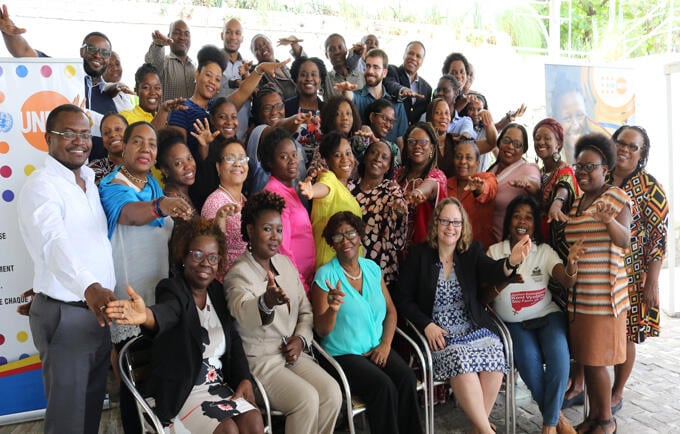PORT-AU-PRINCE, Haiti, 23 February 2018 … UNFPA, the United Nations Population Fund, closed a five-day workshop in Port-au-Prince on 23 February to strengthen the capacity of its staff and partners on humanitarian standards and emergency preparedness.
Forty participants welcomed the fact that the different objectives were achieved.
"This training has allowed us to strengthen our technical capacities for better positioning during emergencies, especially in sexual and reproductive health and GBV care (gender-based violence)," the Technical Director of the Center for Health Development (CDS) says.
Dr. Lionel Barthélemy encourages UNFPA to multiply these workshops in the most vulnerable departments, such as South-East, Grand'Anse, South and North-West.
For her part, the Director of Coordination of the Departmental Offices of the Ministry for the Status of Women and Women's Rights (MCFDF), believes that this workshop enabled the partners to discover the mechanisms that reinforce the rights of women and men in the emergencies, especially those related to GBV for women and girls, to better align with the national contingency plan.
Mimose André Royal encourages UNFPA to meet with all the entities that make up the chain of care for women and girls victims of violence, with a view to a concerted response.
¨The participation of reproductive health managers and midwives from different departments in this brainstorming will allow for harmonization of emergency response actions in the areas of sexual and reproductive health and GBV (gender-based violence)¨, for its part considers the project officer in maternal health at the Family Health Directorate of the Ministry of Public Health and Population, Gislhaine Désinor D'Alexis.
The UNFPA Representative in Haiti also does not hide her satisfaction, saying that participants now have a greater understanding of UNFPA's mandate in humanitarian crises, as well as the roles and responsibilities of the UNFPA office. throughout the cycle of the humanitarian program.
The capacity of national staff and partners to prevent, mitigate and respond to gender-based violence in emergencies, and their capacities for sexual and reproductive health in emergency situations, are indeed strengthened, Marielle Sander adds.
The workshop was punctuated by interactive sessions on various sub-themes related to specific objectives such as "sexual and reproductive health in emergency situations in Haiti: evolution, success and challenges", "communication in emergencies", population dynamics in emergencies - data preparation and information management, tool on adolescent sexual and reproductive health in emergencies, resource mobilization, assessment and advocacy, follow-up and evaluation of the Minimum Initial Service Package (MISP).
According to the 2017 Climate Change Vulnerability Index, Haiti is the third most vulnerable country in the world to cope with the effects of climate change between "extreme" risk countries. In 2018, Haiti continues to be affected by a convergence of humanitarian crises compounded by the devastating Category 4 hurricane Matthew that hit the south of the country on October 4, 2016.
The new UNFPA 2018-2021 Strategic Plan requires that humanitarian response strategies shift from disaster and conflict response to the application of a resilience approach, linking prevention, preparedness and response to national capacity building.
By: Vario Sérant


